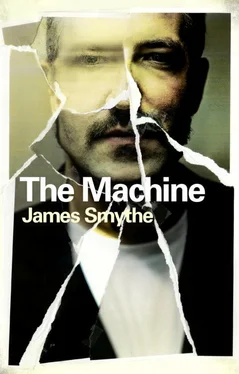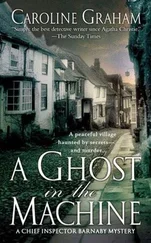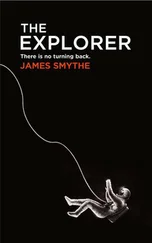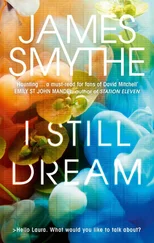Inside the restaurant they’re playing music that Beth recognizes, but in some water-chime musical form. Songs from when she was a child, that she still knows the words to: huge ballads, slow-dance pop songs that once soundtracked hit movies. The waiters all sit around a table at the back, all with half-pint glasses half-filled with lager. Two of the four stand up when Beth walks in.
All right love, one of them asks.
Hi, Beth says. I wanted a takeaway?
Sure, sure. What can I get you?
Chicken korma and a pilau rice, she says. The man nods. He leans back and peers through the door to the kitchen, then nods at the solitary chef Beth can see in there, who’s been leaning against the cookers.
It’ll be a few minutes, the waiter says to Beth. Want a drink?
I’m fine, she says.
She sits at a table by herself to wait, near the window, and she watches the few other people out for the evening, all of them going to get takeaways or hurrying forward by themselves, collars up and eyes down. A group of kids – heads shaven into a step around the back and sides, suddenly popular again, and ripped jeans with smart-looking cheap shirts – walk past: they see her peering out and they spit at the window. One of them undoes his fly and rushes up to her, and she flinches backwards, away from the window. One of them stands at the back and doesn’t do anything but stare, a fixed gaze that won’t break. They all laugh.
Ignore them, the waiter who took her order says.
Bunch of pricks, one of the others says. He doesn’t look up from his beer.
I know, Beth says. The waiter walks towards her table and leans over it. There are curtains that she hadn’t seen, only half-height ones, but he pulls them across, blocking her view of the street, and the kids’ view in.
Better when they can’t see the customers, he says. Beth sits and stares at the curtain for the next few minutes, because she can hear them still out there on the street. They’re laughing about something, down at the kebab house, and there are occasional bangs where they’re throwing something, or hitting something. She thinks about standing up to see what they’re doing, but knows that if they see her it will only antagonize them. She nearly asks the waiters how many times their front glass has been broken. It always looks new, she thinks.
When the waiter comes back with her food (which smells amazing, she thinks, cooked freshly because she’s the only customer they’ve had all evening) he loads it into a plastic bag and throws a few poppadoms in.
You going to be all right? he asks.
Yes, she says. I only live up the hill.
In the estate? He inhales and laughs with the other waiters. I’ll walk you.
Don’t be silly, Beth says.
What else am I doing?
I’m fine.
Look at all my customers, he says. He opens the door for her and stands back, letting her head onto the street first. The boys outside the kebab shop shut up slowly, one by one, falling into line. They’re all some ambiguous age that Beth can’t tell, past the hoods and caps, even in this heat. They’re looking over at them. Just ignore them, the waiter says. He walks next to Beth, briskly, their pace faster even than when she walked down here, and they don’t look behind them. The boys stay quiet, so they don’t know if they’re being followed. Beth pictures it: them dropping their kebabs and cans, leaving them on the side, and then walking behind them as one. Falling into a pack, a tight unit, rapidly advancing, a cloud of dust ready to swallow them whole. That one who stared suddenly at the front, leading the others.
They make it to the lights of the estate, and the bollards. Beth can see her flat from here. At a dash, it’s only thirty seconds away. The waiter stops. You all right from here? He looks back where they’ve come from. The boys are nowhere to be seen.
I’m fine. Thank you so much.
Pleasure. Want to walk me back to the restaurant now? He grins. Joking, joking, he says. Enjoy your dinner.
He heads back down the path towards the road. There’s a bit where there are no lights and he disappears, and Beth waits to see him reappear on the other side of it. When he does she goes into the stairwell, and then along to her flat. She fumbles for her keys, but there’s nobody anywhere near her, and no noise she can hear apart from the background murmur of neighbours’ televisions, and the occasional rustle of a cat. She locks the door behind her, then goes to the kitchen with the bag and unpacks it on the worktop. She peels the lids from the tubs, takes a plate and turns them both out onto it, then sits on the sofa with the plate on her knees, the greasy paper slip of poppadoms on the table. She puts the TV on and tries to concentrate on it. She flicks through channels with one hand, eating with the other. But there’s something else. She can hear it: a buzzing. She mutes the TV, cutting the weather report off midsentence – the symbols all sweating comical suns, not much chance of them saying anything to contradict that – and listens for it. It’s like a fridge, but hers is silent, or an old light bulb about to blow, but hers are all energy-saving modern ones. She puts the plate on the table in front of her and walks around the living room, looking for the source. She can’t find it in here, so she tries the spare bedroom and then remembers about the Machine. The screen is on – still – and the buzz coming from it. Not the screen: just, vaguely, the Machine itself. She can’t pinpoint it, but she’s sure of the source. She puts a hand on the casement and there’s something, a movement. The most subtle vibration.
I should switch you off, she says to it. She leans down to the plug and flicks the switch and the Machine’s screen goes dark. She can still hear the buzz, though, as she goes to leave the room: and as she lies in her bed, staring at the ceiling, thinking about how this is all going to go. And still, even with it this close to actually happening, how she has her doubts.
She swims first thing in the morning. Only some mornings – not enough to call it a regime, but more than a habit. Some deep-seated feeling about being so close to – inside, even, beneath and through – something that caused so much destruction and yet is somehow blameless. She gets up before anybody else, when it’s still barely light, and she peels her clothes off and swims out against the waves into the water, and then back: and she stands on the beach and waits for the sun to dry her, which only takes minutes, and then she dresses herself. She doesn’t get her hair wet – she ties it up above her head, a style that she never used to wear, but that’s practical for her, here and now – and she puts her work clothes straight on and then sets off.
Her walk to work takes her along the path that runs adjacent to the coastline. She and Vic had always wanted to live by the sea: they had said that when he retired it was what they would do. (Without him here, she sometimes thinks, this feels almost like cheating on him, with this place instead of another man. She is sure that he would – will – forgive her.) The path is hard ground, old mud that’s faded and cracked underfoot. It falls just shy of the green grass; as she walks she keeps her eyes on that side. On the other side are the roughest blocks, the ones where the people always seem crammed in. These were the last ones built, designed to take the council housing overspill from Old Portsmouth after the flooding. The people there are bitter that they ended up here. They didn’t choose to move: it was their only option, if they wanted to live where they could still keep their jobs. Most of the children from the estate go to her school, and she teaches many of them, or tries to. The worst of her kids invariably come from the worst parts of the island, where their parents have sob stories about how they lost their jobs on the mainland, or their homes. There’s a joke around Portsmouth and Southampton, where they call the island Alcatraz and refer to the ferry that runs six times a day as the prison boat. They don’t try and hide it. Anybody with real money left the island a long time ago. Before this, Beth would have been one of those people: running before they sank along with the rest.
Читать дальше
Конец ознакомительного отрывка
Купить книгу










